(Note: If you haven’t read it yet, my introductory post on this Star Trek: The Original Series rewatch is a good place to start.)
Original Air Date: November 3, 1967
Crew Death Count: 0
Bellybuttons: 0
This week we enjoy the delightful return of Roger C. Carmel in the only direct sequel in all three seasons of TOS, updating us on the whereabouts of galactic rogue Harry Mudd, previously seen in “Mudd’s Women.” The episode’s title is believed to have been inspired by both the 1934 Robert Graves novel I, Claudius, and Isaac Asimov’s themed short story collection I, Robot. The episode’s premise is hauntingly familiar to us: the Enterprise is hijacked – again. This time the ship is redirected to an unnamed planet populated by androids. Harry Mudd, having escaped from prison after his last encounter with the crew, stumbled onto the planet and found the androids so eager to serve humans, they wouldn’t release him unless he provided them more subjects. The Enterprise crew is just the ticket, giving the androids hundreds of “masters” and Mudd a ship with which to roam the galaxy. The initial landing party – Kirk, Spock, McCoy, Chekov, Uhura, and Scott – must navigate Mudd’s scheming and their android captors to escape.
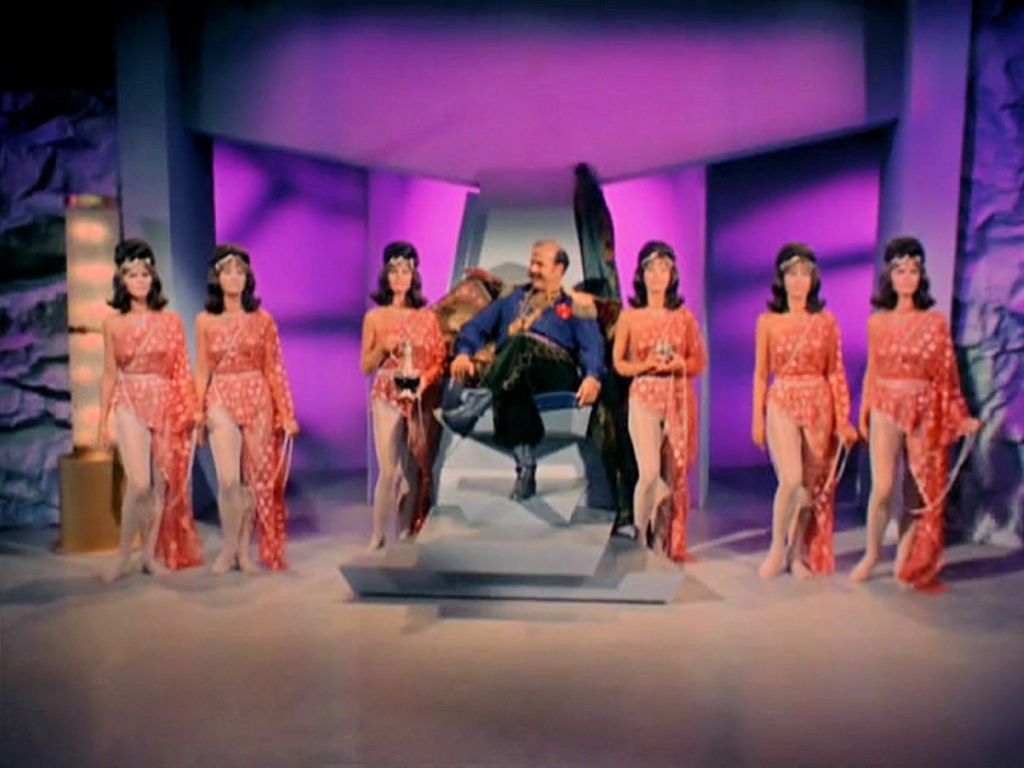
Abducting the Enterprise, which occurs entirely in the prologue, is laughably easy. The culprit is primary android Norman (Richard Tatro), who fools our naive crew into believing he’s an actual Starfleet officer. Apparently anyone can suit up in a Starfleet uniform and board a ship of their choosing at any time. McCoy identifies something suspicious about Norman; for example, he “won’t talk about his background.” (Didn’t someone do a background check???) McCoy doesn’t have much beyond generalities of unemotional behavior, to which Spock appropriately responds, “Labels do not make arguments.” This doesn’t alter the fact that Spock is the one who should be embarrassed for not questioning the obviously fake officer. This all makes “I, Mudd,” something of a happy version of the TNG episode “Descent,” where an entirely different type of android collective awaits the Enterprise crew.
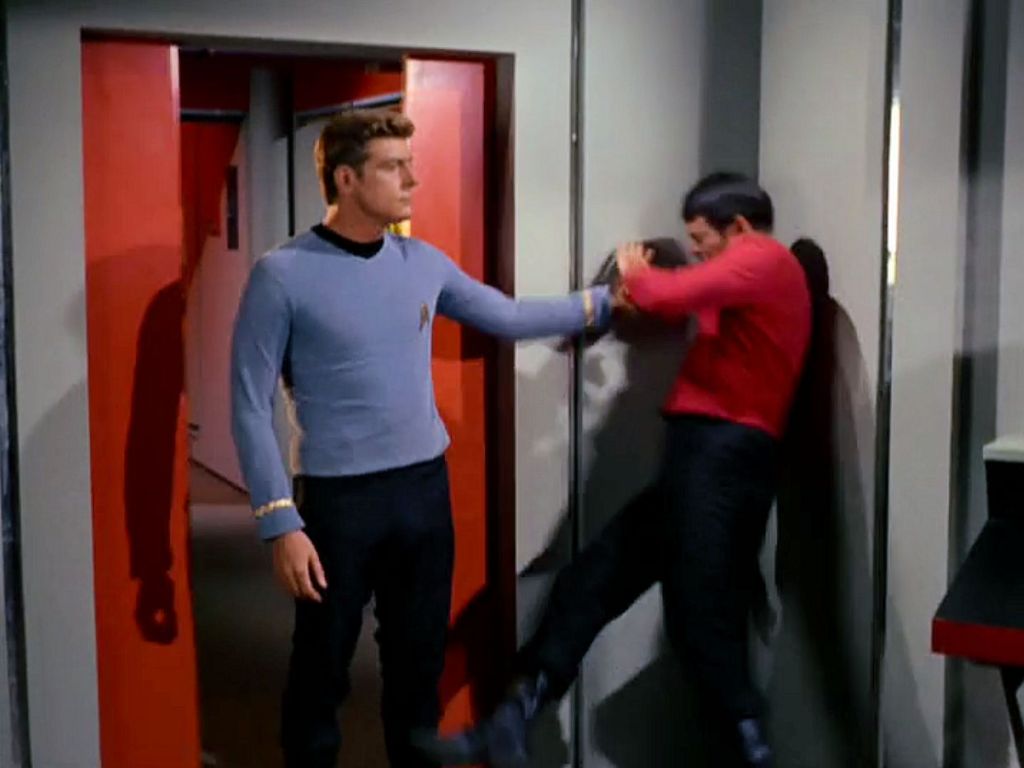
The scenario also reminded me of the 2019 film Parasite, involving a servant-class family attempting to take over the household of their economic superiors. The androids of “I, Mudd” were created by “the Makers,” beings from the Andromeda Galaxy, for the sole purpose of serving. The Makers have long since died out, leaving the androids to wait for another master. Here we have another instance of an ancient civilization impacting the 23rd century Federation; we’ve seen similar outcomes in “What Are Little Girls Made Of?”, “The Apple,” “The Changeling,” and “The Doomsday Machine,” among others.
Initially, the androids offer Mudd whatever he likes, including several new series of attractive female androids designed to his specifications. Mudd thinks he has found paradise, and we know what that means. The androids are so committed, they refuse to let Mudd leave. They later intend to imprison the Enterprise crew with a similar scheme, and there are signs the plan might succeed. Each member of the landing party faces their own temptation: McCoy could spend a lifetime in the medical research facilities; Scott wants to spend more time in the engineering labs; Uhura is offered immortality in an android body; Chekov is offered compliant female companionship. (“We are programmed to function as human females,” the Alice androids (Alyce Andrece and Rhae Andrece) tell Chekov, another sentiment that will reappear in TNG, when Tasha Yar confirms that Data is “fully functional” in “The Naked Now.”) Mudd attempts to lure Spock with a planet full of logical, unemotional thinkers, but Spock’s lack of emotional attachment is the very quality that allows him to resist such schemes. Thankfully, the entire crew is never fully sold on the idea. When Kirk reminds them, “Here we are, birds in a gilded cage,” they are ready to work together to escape. Soon enough, Mudd joins the crew, because the androids decide to ditch Mudd and take over the galaxy themselves.
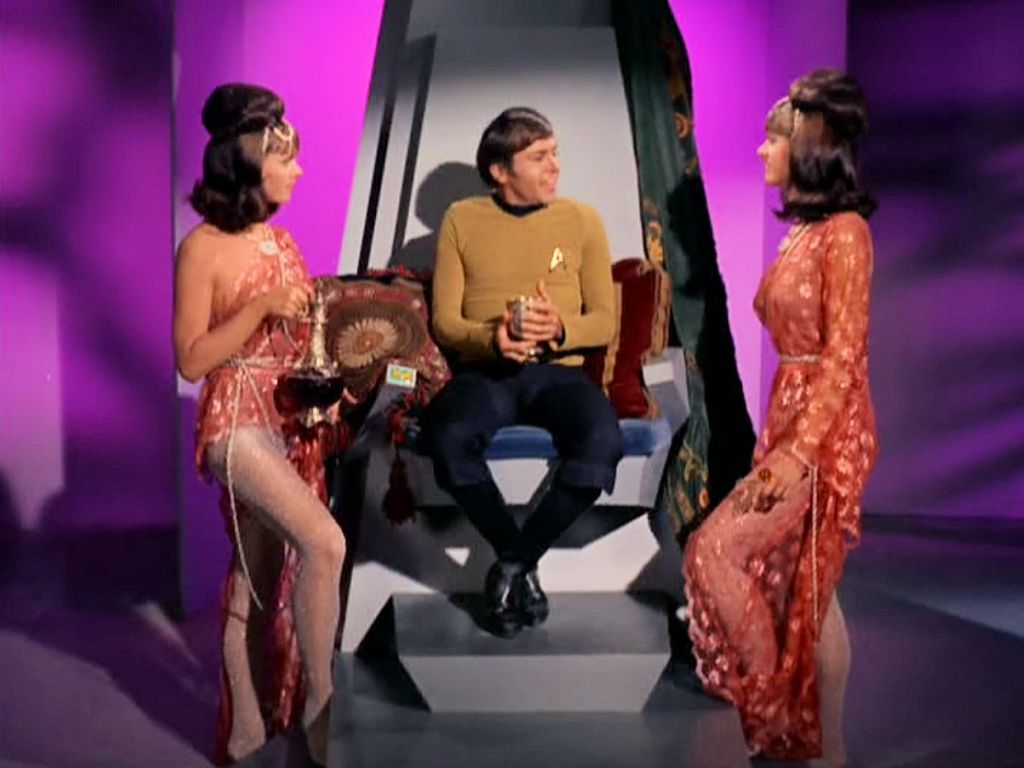
Sorting out who is in control, humans or technology, makes up the lion’s share of the plot. Mudd controls the androids, but only to a point. Mudd even directs the androids to construct a robotic version of his wife, Stella (Kay Elliot), portrayed as a stereotypical nagging housewife, who scolds him for old times’ sake until he commands, “Shut up!” (In typically Mudd style, he blames the real Stella for driving him from home, making her the scapegoat for his life of crime.) Spock quickly deduces the androids are networked in a Borg-lite collective, with all information channeled through Norman, the only android without a duplicate, who wears a tag conveniently identifying him as number one. It’s an odd conclusion for Spock to reach, contradicting the independent androids from “What Are Little Girls Made Of?”
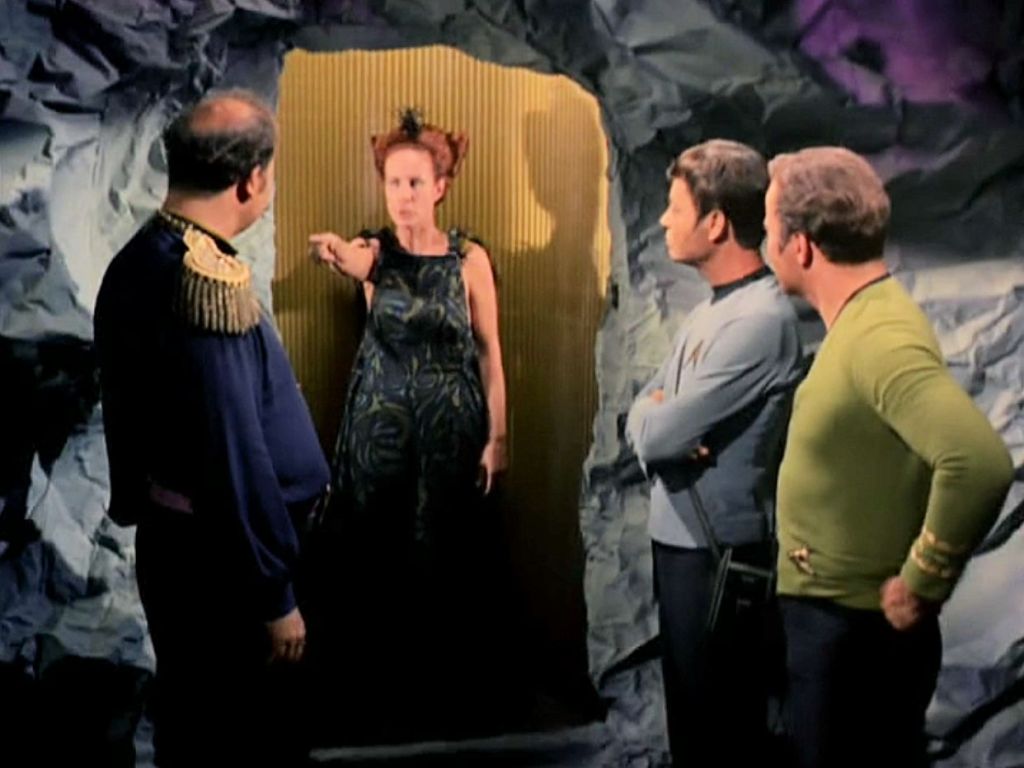
Runaway technology was a driving subject behind numerous TOS episodes as a result of computer technology – including mainframes, networking, and robotics – that was changing rapidly in the 1960s. Numerous advances that would be necessary for networked, power-hungry robots were unveiled throughout the early to mid-1960s, including computer time-sharing, transistor-based computers that eliminated bulky vacuum tubes, robotic arms, and a real-time chat program called ELIZA. An ELIZA application called DOCTOR simulated a psychotherapist, primarily by rephrasing patient statements as questions. ELIZA was surprisingly successful at eliciting emotional responses from patients, but, like the androids in “I, Mudd” who are “not programmed to respond in that area,” the effect didn’t hold up through in-depth conversations. And like the ELIZA DOCTOR program, the androids’ ultimate undoing is their inability to comprehend the nuances of human desire and the unpredictability of human happiness. When Alice 471 disagrees that the Enterprise – “a mechanical device” – is a valid want or desire, Kirk responds, “No, it’s a beautiful lady and we love her.” Drawing abstract significance from tangible objects is a uniquely human pursuit. Norman claims, “Dreams are not real,” failing to understand that for humans, dreams can become too real.
Control over society was also a central theme of I, Claudius. Are the people best governed under a republic – in which an elected legislative body enacts the will of the population – or in an empire, with one individual calling the shots? Claudius comes to the unhappy conclusion that life is more efficient without all the messy debating and voting of a republic (although the imperial approach doesn’t turn out so well, either, in the sequel Claudius the God). Mudd’s androids don’t strictly qualify as an emperor, but the end result is the same: imposing order on the humanoid population without their input. Mudd himself expresses the point when, during the “overload the androids with contradictions” scene, he shouts, “For what indeed is a man [and woman!] without freedom? Naught but a mechanism trapped in the cogwheels of eternity.”

Asimov’s I, Robot perhaps offers a more direct comparison to “I, Mudd.” Asimov’s Three Laws of Robotics, first specified in the 1942 short story Runaround and included in the I, Robot anthology, are clearly relevant here:
- First Law: A robot may not injure a human being or, through inaction, allow a human being to come to harm.
- Second Law: A robot must obey the orders given it by human beings except where such orders would conflict with the First Law.
- Third Law: A robot must protect its own existence as long as such protection does not conflict with the First or Second Law.
Mudd’s androids acknowledge they are programmed to do no harm. However, just as Nomad’s quest for perfection ultimately required him to kill everyone in “The Changeling,” the androids’ mandate to serve is carried to its extreme conclusion, and the androids rely on a variation of the First Law to justify their new plans to colonize the galaxy. “Your species is self-destructive,” Norman says, “You need our help.” Soon, Norman offers an even more altruistic spin: “We cannot allow any race as greedy and corruptible as yours to have free run of the galaxy.” The androids have become colonizers with a manifest destiny to conquer the Federation. The androids demonstrate an advanced strategic vision when Spock asks exactly how they will take over the human race. Norman’s response perfectly predicts a culture deadened by gadgets, consumer goods, and fast food: “Their kind will be eager to accept our service. Soon they will be completely dependent upon us.”

The contradiction between the androids’ imperialist plans and the First Law lies at the heart of their demise. The humans point out that confining them to the planet is, in fact, harmful to the human spirit, creating a conflict between the First and Second Laws: “To serve us, you must obey us,” Mudd says. In making this point, the crew once again, unwittingly, exposes the flaws of American-style capitalism, primarily in a bit of performance art by Scott and McCoy:
McCoy: “You offer us only well-being.”
Scott: “Food and drink and happiness mean nothing to us. We must be about our job.”
McCoy: “Suffering in torment and pain, laboring without end.”
Scott: “Dying and crying and lamenting over our burdens.”
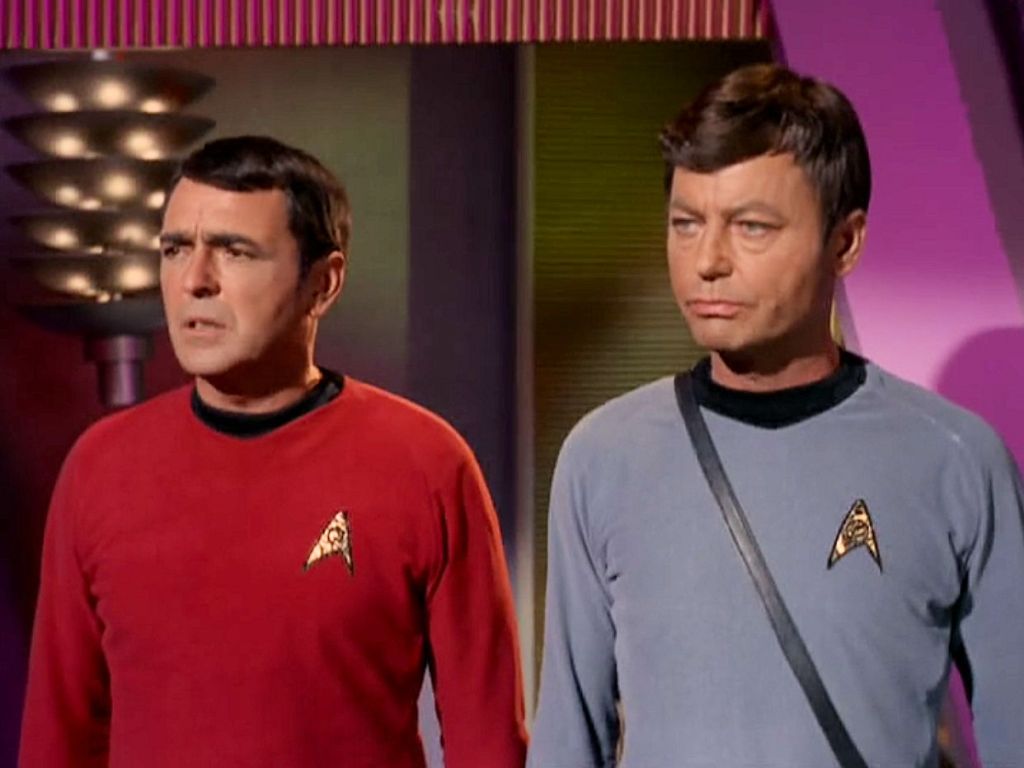
Welcome to America, where we will die for the right to work ourselves into oblivion! Ultimately, the androids can’t resolve the contradictions of serving from a position of superiority, or the dense complexities of human emotions. Despite the repetitive plot device of Kirk and company once again talking a computer into self-destruction, the episode does a fine job of capturing the randomness of human nature and our complex ways of organizing ourselves. Mudd is a perfect intermediary for the Federation and androids because he exposes the similarities between both cultures. The android planet is an ideal spot for Mudd to regroup, being served only to the extent that it’s convenient for his hosts, but the scenario is far too confining for such a restless spirit. Federation-controlled areas of the galaxy are equally limiting, offering Mudd enough space to run the occasional con, until the authorities clamp down. The very crime that sent Mudd fleeing toward the android planet, use of patents without paying royalties to the technology owners, is a perfect example: the Federation deck is stacked in favor of those with the most capital and intellectual property, protected by restrictive patent laws, while Mudd, the real “defender of the free enterprise system,” will never be more than a small-time operator. “Knowledge should be free to all,” Mudd claims, and I’m inclined to agree. Both systems tolerate only a limited degree of personal liberty, giving Mudd just enough freedom to get in trouble, but ultimately restricting full exercise of his “talents.”
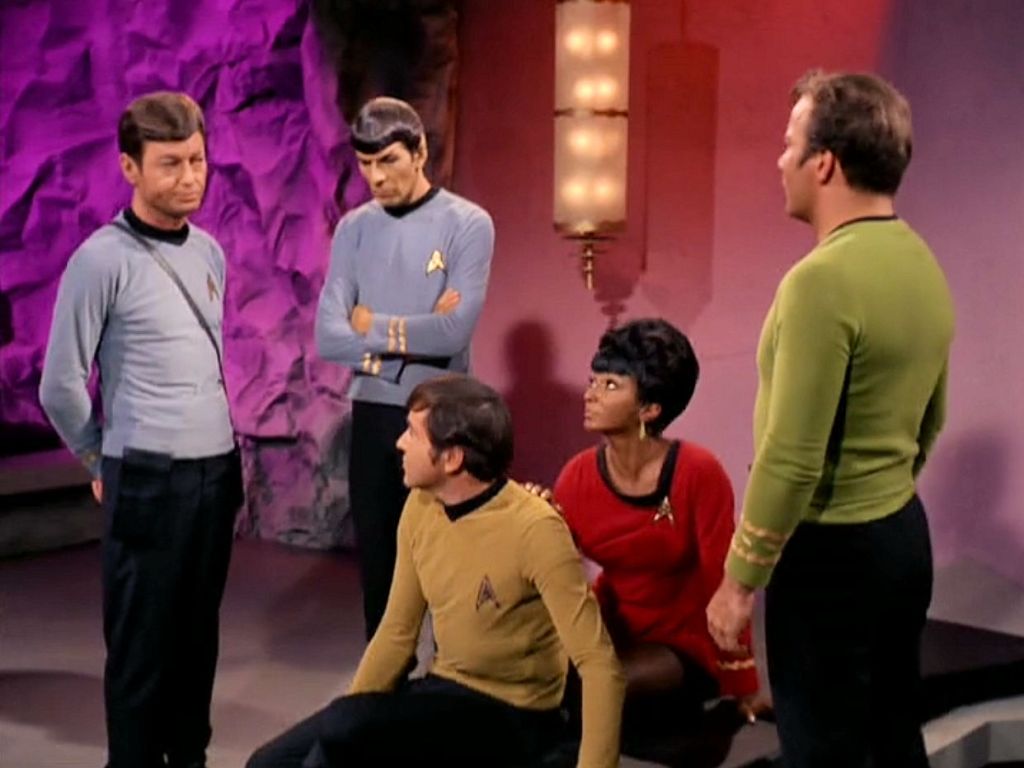
A scene early in the episode brilliantly illustrates how free market capitalist Mudd interprets the world differently than pragmatist Kirk: While Mudd describes his escape from accountability for the patent scandal, Kirk translates. Notice how Mudd reframes not only his own actions, but those of the officials seeking to imprison him:
Mudd: “I left.”
Kirk: “He stole a spaceship.”
Mudd: “The patrol reacted in a hostile manner.”
Kirk: “They fired at him.”
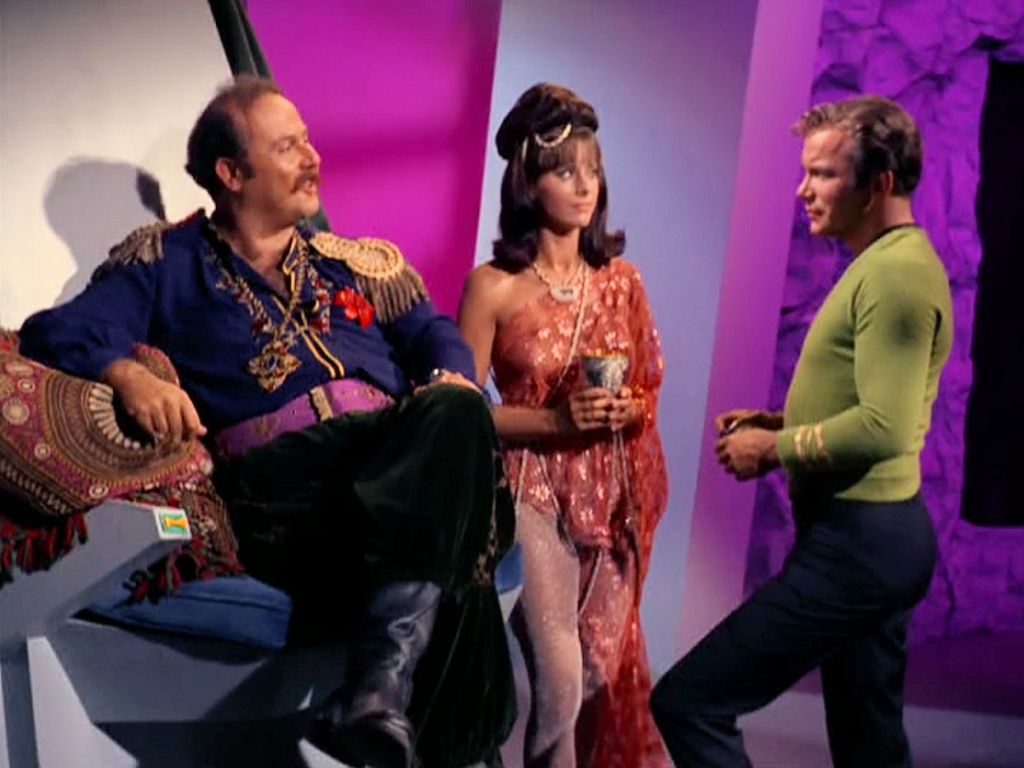
The episode’s end amounts to a reset: the Enterprise departs and leaves Mudd in the androids’ care (with no stated plans to investigate the appealing immortality option). The primary difference is that, this time, Mudd is supervised by hundreds of Stella models, the shrewish wife ad infinitum, and she no longer responds to the “Shut up” command. If this seems a mild punishment for aspiring to conquer the galaxy, remember that Mudd, wheeling-and-dealing in a few stolen patents, was never the true villain. Kirk understands this and leaves with no hard feelings. No, the real antagonist is a misguided expectation of getting something for nothing, a myth of value produced from thin air, in this case robot servants so thorough we can’t live without them. We’re told the androids have been reprogrammed (that was quick!) to be more docile, but this is still a flawed solution, given how quickly the situation got out of hand before.
Human subservience to robots, however, is essentially the future that I, Robot predicts. In Asimov’s fictional world, robots evolve beyond the point of human control. Still locked in to their original programming and unable to harm us, the robots become caretakers for the entire human species. The final story in the I, Robot cycle concludes: “They [the Machines] are robots, and they follow the First Law. But the Machines work not for any single human being, but for all humanity, so that the First Law becomes: ‘No Machine may harm humanity; or, through inaction, allow humanity to come to harm.’” If only our social media had been designed with this in mind – now we yield to technology without the benevolence of the First Law. “I, Mudd” combines the Frankensteinian aspects of “The Changeling,” a reminder to value life over technology we may not be able to control, with a cautionary tale about the illusion of paradise. Whether we comfort ourselves with tools intended for convenience (“Alexa, how do I escape the surveillance state?”), safety (39,740 firearm deaths in the U.S. in 2018), or efficiency (How many child slave laborers does it take to make an electric car battery?), the perfect consumer lives we create for ourselves might be as big a trap as Mudd’s androids. We can transfer the suffering down the supply chain for a while, but eventually we’ll all endure the consequences. It’s not just our robots that need “do no harm” programming – that code should be hard-wired into all our hearts and minds.
Next: Metamorphosis